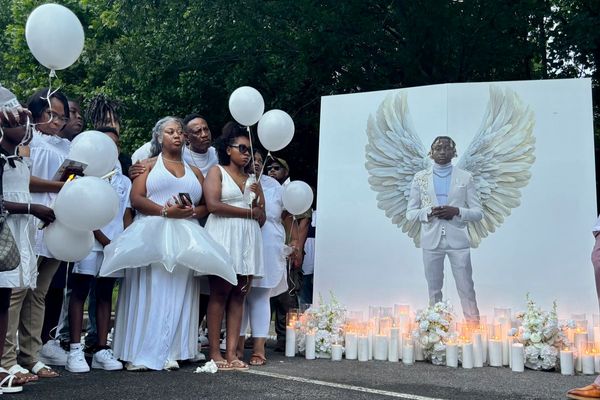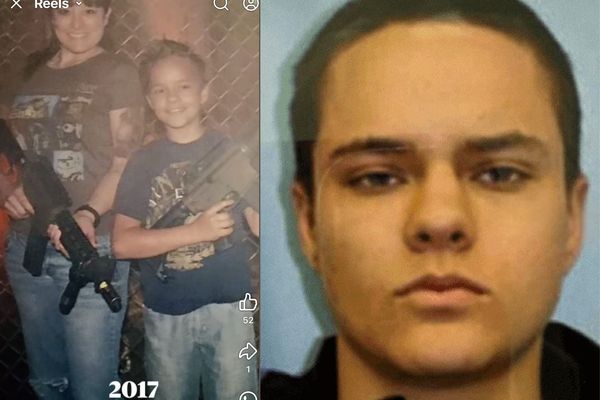The moment Hema Salaat (first name changed to protect identity), 13, stepped into the car, she knew her life had changed forever. Over the next 48 hours, she was raped and physically assaulted by Ashok Patel, whom she still calls bhai. His wife, Renuka, stood by, encouraging her husband to torture her into submission. Hema was about to be sold into what is a combination of slavery and rape, to a man many decades her senior.
In what was a departure from the norm, the Gujarat police immediately investigated a missing complaint filed by her parents, and she was rescued. Officers usually don’t snap into action, assuming that teens elope out of choice. In Hema’s case, what caught their attention was the presence of a woman. Their action also led to the freeing of Priya Patni (first name changed), 14, another child-bride victim who had been kidnapped 11 months earlier. She had been sold for ₹3 lakh, while a go-between got ₹5,000.
The police have tracked down six of the alleged perpetrators, but Hema and Priya are likely one of many teens from impoverished, so-called low-caste, marginalised families, who are physically tortured and mentally broken by the cruel commerce of underage bride trafficking.
Setting a target
Hema’s kutcha house, a doorless structure of mud and thatched walls covered with an asbestos roof, lies on the outskirts of a village, next to a crematorium. Situated in the Ahmedabad district, her currently unemployed parents struggle to meet life’s daily needs.
On the morning of May 11, Ashok and Renuka Patel allegedly arrived at the house. They knew the family through Hema’s cousin. “Let us buy your daughter some clothes and a payal; she is just like our daughter,” Hema recalls hearing them say, through the porous walls. Caught between the excitement of new baubles and the discomfiture of going out with strangers, the decision was made for her by her parents, after the Patels made several convincing overtures.
“They said they would rent a local vehicle driven by a fellow villager. He called us close family friends, and made us believe that we could trust him and his wife,” says Devika Salaat (first name changed), Hema’s mother. She’s distraught that she fell for the ploy. “I would never have let her go with a stranger, but they told us about their sister who lived in the neighbouring village. And they seemed to be close friends of our nephew.”
The next day, the Patels, with Hema, went to the neighbouring village in a car. There, they met Parul, who they claimed was Ashok Patel’s sister. They bought clothes for Hema and dismissed the vehicle. The concerned driver called her father, and the Patels reassured him that all was well. “They said they wanted to spend some more time there, and that they would return soon. Ashok bhai said he was like her father in my absence,” says Ramesh Salaat (first name changed), Hema’s father. The family that shares one mobile phone among five members, called again, but the phone was not reachable.
Hema was allegedly taken by the Patels and Parul to an isolated hut surrounded by large plots of agricultural land in Mehsana, a village about 100 km away. Ashok confined Hema to a room, beat her, and raped her repeatedly over the next 30-odd hours, as she screamed for help.
Her worried parents registered a complaint at the Kanbha police station on May 13 and an FIR was lodged early in the morning. That day the car driver and Parul were tracked down. Once she told the police the story, Parul accompanied the team that set out to locate Hema. “When we reached the area where Parul had dropped Hema off, she struggled to identify the hut, as it was pitch dark, and we did not want to alert them,” says sub-inspector Jayesh Kalotra, the principal investigator on the case. “Carefully walking through the fields, we reached the huts and surrounded the place,” he says. There were four huts in a cluster, and the first they entered had Renuka and Moti Senma, who owned the houses. The second hut had Ashok and Hema.
“Ashok was sleeping, but the moment she saw us, Hema leapt from the bed, and did not leave our side until we handed her over to her parents that night,” says Mr. Kalotra.
Socio-economic vulnerability
Hema is one of the many women from the Scheduled Caste, Scheduled Tribe, and Other Backward Classes who are particularly vulnerable to trafficking. Acute poverty, social marginalisation, no education, a low awareness of rights, and little access to justice, are all reasons. “Because of their socio-economic conditions, lack of awareness and education, the tribal belt, Dalits, and OBCs become easy targets of trafficking in States like Gujarat,” says Prof. Vijay Raghavan, of the Centre for Criminology and Justice, Tata Institute of Social Sciences, Mumbai. He is the principal researcher of the State report ‘Human Trafficking in Vulnerable Districts of Gujarat’, published in 2023.
Prof. Raghavan says that while identifying the vulnerable families as targets, the upper caste perpetrators also identify and hire trafficking agents from deprived socio-economic backgrounds, people looking for ways to exit the rut of penury.
For instance, Parul, who is a single mother and lone breadwinner, was recruited on the promise of commissions. She would get money for helping transport girls, but also from multiple marriages to the Patel community’s men. After each wedding she would loot the jewellery and money and flee.
“During the investigation we unearthed several cases against her for being a looteri dulhan (runaway bride). But on further interrogation we found that Ashok was the mastermind and would use her status of being a single mother from a poor household to extract such transactions,” says a senior Gujarat police officer. After multiple rounds of interrogation, the Gujarat police learnt that on giving birth to a girl child, Parul’s original ex-husband would torture her and the child. To provide for her only daughter, Parul became Ashok’s aide, she confessed to the police.
“While cases of bride trafficking involving abduction have been brought to light with this case, multiple incidents of marginalised women being sold to Patel men for marriage have been happening for years now,” says Sejal Dand, co-founder of Anandi, a non-profit that works with rural women with little agency.
The lack of political power assures the traffickers that the families of the missing women will find it hard to seek justice, says a senior Gujarat police officer. According to the 2020 National Crime Records Bureau data, Gujarat has 41,621 missing women, of whom the Gujarat government clarified in a tweet that it had traced 94.90% of them, but it is unclear how many were trafficked. In fact, the Gujarat Police handle tweeted on May 8, “The investigation has revealed that women go missing due to family disputes, elopement, failure in examinations etc. However, investigation into missing person cases has not revealed episodes of trafficking for sexual exploitation, organ trafficking etc.”
Deep apathy
After arresting and seizing all the devices belonging to the Patels, the Kanbha police team led by the Superintendent of Police Amit Vasava, retrieved their call detail records (CDR), which further led them to Cheher Singh, 34, and Amritj Thakor, 70. “From the data received from their phones we found that even before Ashok and Renuka reached Hema’s house, plans of selling her to a middleman named Cheher Singh had been made,” says Mr. Kalotra. The Gujarat police played a call recording for The Hindu, where Patel tells Singh that the “vastu” is at Mehsana and will soon reach them, after which they can sell the “vastu” to a client of their choice.
The Patels would change the names of the victims and give them the ‘Patel’ surname for easier acceptance of the girl by potential Patel men. Singh and Thakor would often change the girls’ surnames to Darbar while selling them to men of the Darbar community in Rajasthan, landed ‘nobility’. “There’s a high demand for women in both these communities because of the skewed sex ratio. Upper caste men are willing to pay a bride price,” says Mr. Kalotra.
On further investigation, the Gujarat police found that there had been a missing-person report filed with the Shahibag police station and an FIR lodged 11 months ago. There was also phone evidence from Singh’s phone, and his own admittance to trafficking.
“When we traced Priya Patni, we found that she had been married for the second time to a Patel man and was being treated as a bonded slave at her in-laws’ place,” said a senior Gujarat police officer.
Priya remembers going to a fish market near her home, when a neighbour told her about free clothes and anklets being given out. When she reached there, Renuka covered her mouth, put her in a rickshaw and took her away. Over the next 11 months, the daughter of the daily wage-earning couple was beaten and sexually assaulted by both Ashok and his older son, a young adult, who is on the run, and by men from whom Ashok would charge money. She was later sold to a 40-year-old man from the Patel community for ₹3 lakh. Every day Priya would pray for a miracle.
After three days of getting Priya married to her first husband, the couple, pretending to be her parents, came back to take her to her ‘maika’ (maternal home). From there, they took her to another house and sold her to another Patel man for ₹5 lakh.
The first FIR filed against Ashok was in 2017, in the Vejalpur Police station, Ahmedabad, under IPC Sections 363 (kidnapping), 366 (acts of kidnapping or abduction with the intent to compel a woman to marry any person against her will or to be forced into illicit intercourse), 376 (sexual assault), the Protection of Children from Sexual Offences Act, 2012 and the Scheduled Castes and Scheduled Tribes (Prevention of Atrocities) Act, 1989. However, the police feel that he has been associated with bride trafficking for close to a decade or more. “We have also realised that many ‘looteri dulhans’ (runaway brides) are probably victims of such rackets,” adds Mr. Kalotra.
After no investigation for 11 months, when the Patni family had almost given up, the police rescued Priya and reunited her with her family. “I had submitted multiple letters to police officers and local BJP politicians, but nothing happened. There was no investigation, and they would shun me saying your daughter has run away,” says Virat Patni, 45, Priya’s father.
While Hema’s missing case was solved within 48 hours, most missing cases of young women are barely given the attention that such a case deserves, on the assumption of elopement, said a senior Gujarat official. Mr. Kalotra says that missing girl cases are not investigated enough.
If they were, then Hema and Priya, and many other girls, would not face the life-altering trauma that they have. Now, with no mental health support, and a State-given compensation of ₹2 lakh, Hema, who was engaged to be married before the incident, will go through with the wedding. Her fiance does not know of her ordeal.







